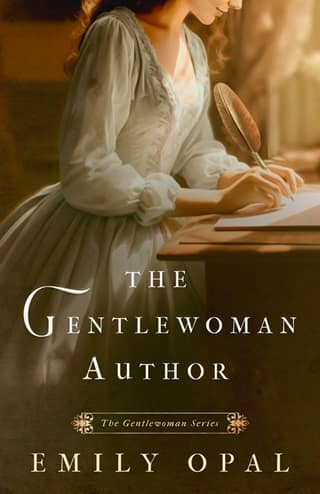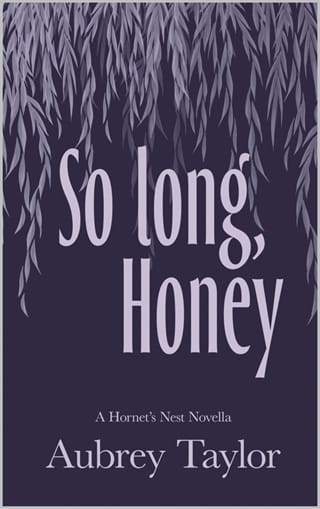Chapter 11
Chapter Eleven
T he tedious conversation over Mr. Johnson’s poetry had Daniel questioning the wisdom of holding meetings every two weeks. Since many Bath residents did not stay long, the bi-monthly frequency made sense, but so far Miss Thorpe’s conversation with Mr. Savage was the only thing interesting about the day’s literary society meeting. He shouldn’t be eavesdropping.
Miss Thorpe leaned toward Mr. Savage and asked, “What is it you would do if you could do anything?”
He did not hesitate. “I would set myself up as a farmer and find a lady to share my life with. I love nothing more than quiet country, family, and the outdoors.”
Daniel scoffed. Mr. Savage hated dirt almost as much as he despised animals. He claimed a love of horses but was useless at recognizing a solid bit of horse flesh. He could no more drive a team with finesse than ride a horse with ease.
Mr. Savage sighed, a dramatic exhalation that had Daniel rolling his eyes. “My past is riddled with regrets. I’ve been unscrupulous. But tied to my mother and sister, it is difficult to begin anew.”
Struck with the urge to knock Tobias on the head, Daniel folded his arms over his chest. While it was true his mother and sister were in his care, he did a poor job of it. From what Daniel could tell, he gambled away their money.
He should explain to Miss Thorpe that their fathers had arranged for their marriage, if only to keep her safe from Tobias, but something held him back. More than the embarrassment of explaining and the fear she would not be pleased, he hesitated to solidify the unannounced engagement.
He would marry her for Almery, but he grasped the hope that another option would present itself to Miss Thorpe. If she called off the engagement, his parents could do nothing. His gaze shifted to Mrs. Allen.
Miss Thorpe put her hand on Tobias’s arm, clearly moved by his plight. “You will find a way to reclaim your life.” The two of them shared a long look that made Daniel’s stomach turn sour. Their conversation concluded, but Daniel would speak with Tobias about the way he was misleading an innocent and gently bred young lady. She deserved a far better match than Tobias. Someone who would never lie about his actions or spend so much time in gaming hells.
He glanced again at Mrs. Allen, who sat in a corner near the fire, detached from the gathering. She captivated him, physically and in every other way. Her age lent an assurance that younger women lacked. Though he hated to compare her to the duplicitous Miss Jensen, he could not prevent himself from admitting his former fiancée’s inferiority, which showed in looks, in manners, in intelligence. Most importantly, Mrs. Allen was honest. The ease of their conversation, her straightforward speech and open smile, convinced him she was trustworthy.
During the last literary meeting, she paid close attention to the discussion but said little. Should he tell her what he overheard between Tobias and Miss Thorpe? Daniel almost laughed at himself. She regularly emerged in his thoughts, so he dreamt up reasons to speak with her. Even more troubling was the warm expansion that filled his chest. Her eyes flitted up to meet his. His stomach tightened when she smiled, then faltered as she glanced around the room and its general ennui. No one spoke, except for Mrs. Eliot and Miss Barry. The amused look she shared with Daniel sent a thrill right through his chest. He pushed his feet into the floor, ready to make his way to her, but when her focus shifted to the fire, he lost nerve.
Mrs. Eliot and Miss Barry were insulting one another rather than having a true debate. Their argument was uninteresting and the room too warm. More than one attendee had given way to afternoon fatigue. A few heads slumped or lolled to one side. Mr. Bateman, however, followed the argument with enthusiasm, nodding vigorously in support of Miss Barry’s points.
Mr. Savage stifled a yawn and interrupted Miss Barry by quoting a line from the poem. He must have just come upon it. “Life protracted is protracted woe.” I’d wager Johnson is a merry fellow. Love to have him at a soirée. Too bad Lady Mary has no more novels.” While the comment was intended to end the discussion, the ladies did not heed.
Mrs. Eliot drew herself up and raised her sharp brows at Miss Barry. Daniel sensed that whatever Mrs. Eliot said next would be her final blow. A small cough from Mrs. Eliot alerted the drowsy room. Heads raised and the guests made ready to take mental notes for tomorrow’s gossip.
“The irony is lost on no one, Miss Barry.” Mrs. Eliot paused and took in her audience. “You agree adamantly with Johnson, all the while displaying so many of the propensities he warns against. “Does envy seize thee?” Or will “Wealth unloved without a mourner die?”
Miss Barry, wealthy and a spinster, hardened. Her eyes narrowed, her mouth straightened, her hands, like daggers, pressed against one another in an attitude of prayer. Mrs. Eliot laughed airily, with an unconcerned wave of the hand that seemed to irritate Miss Barry further. Everyone, except the aloof Mrs. Allen, waited for Miss Barry’s rebuttal.
“You are not without your evil tendencies,” Miss Barry said, “grasping for social status that no one whose husband is in trade will ever achieve.”
“I never claimed otherwise. Unlike you, I rejoice in the weakness that will be my demise. I know what I am.”
Daniel had to acknowledge Mrs. Eliot’s clever play. Agreeing with her own folly took the sting out of anything Miss Barry could throw at her.
“And you associate yourself with that Mrs. Allen, as she calls herself.”
“So I do. My wonderful friend.” Mrs. Eliot showed no concern, but Mrs. Allen sat up, her cheeks growing red.
With a haughty glance around the room, Miss Barry’s attention rested on Mrs. Allen. Daniel wanted to rub the smugness right off her face. “Do you know what she is?” Miss Barry asked. Mrs. Eliot did not answer the question. “She is the author of that rubbish, A Woman Who Loves .” Miss Barry’s chin lifted and her eyes gleamed. “Deny it if you can, Lady Mary.”
Mrs. Eliot raised a brow and glanced at Mrs. Allen, who opened and closed her mouth. Of all the fodder for gossip gathered over the last few minutes, this was the prize morsel. Was it true? Mrs. Allen possessed an estate in Ireland, but that provided little foundation for the claim.
“What a ridiculous accusation,” Mary said, her voice an octave too high and her face blossomed red.
“You are a widow and own an estate in Ireland. You lived in Bath in your youth. Not only did you author a work of complete nonsense, you also wrote yourself into the story as one who supports irresponsible behavior from our young people.” Miss Barry’s superior tone grated like a magistrate laying out a sentence to miscreant.
No one slept now. They all looked from Miss Barry to Mrs. Allen. Daniel groaned. If it was Mrs. Eliot’s intention to become the most interesting hostess in Bath, she accomplished her purpose. No one would decline her invitation. But he could not approve of her method. She achieved her goal at the expense of Mrs. Allen. Why didn’t she protect her friend?
Mrs. Allen stilled. Where her cheeks had been red before, they were now pale. No doubt from rage at the preposterous accusation. Daniel waited for Mrs. Allen to speak. If she had authored the novel, she had reason to be proud of her work and would not deny it.
“Come, Miss Barry. The person you describe may just as well be you.” Mrs. Allen’s voice sounded strained, as if her throat was closing. She did not deserve this attack.
“Liar.” Miss Barry’s pronouncement elicited an audible gasp from the room. She smirked.
“But thank you for imagining me capable of such a thing. The idea!” Mrs. Allen’s voice was breathy and her laugh weak. She clutched her hands in her lap, staring at the floor. Daniel did not understand. After watching her with Mr. Bateman, he knew her capable of defending herself. The clock ticked into a silent room. Mrs. Allen pulled a bit of lace at her sleeve, hands trembling.
To call her a liar! He stood and made his way toward the fire. He stood by her side, reached for her. Under his hand, her shoulder was soft and warm. “Mrs. Allen is a gentlewoman. She is not the sort of person who drafts novels. And if she tells you she did not write the book, her gentility is proof of her word.”
“Hear, hear.” Came a few voices from around the room.
“Quite,” Mrs. Eliot said, with an appreciative nod to Daniel.
L iar.
The accusation echoed and resonated. Though she told no direct lie, the denunciation sat thick and scratchy in her chest. The entire room had stared at her, their looks at first curious, then accusing. Had she really imagined no one would find her out? And now what? The impeccable behavior she strove to achieve became a mockery.
Her hands wobbled over knitting needles, an erratic pair of socks taking shape on her lap. She set the needles down and closed her eyes to keep them from straying to her writing implements. She had a traitorous heart and a rebellious temperament that urged her to pick up the pen.
First, she would like to scratch out Miss Barry’s eyes. Why had that horrid woman accused her when the quarrel was with Agnes? A friendship with Agnes did put one in the line of fire. But oh! The disgrace. And then Mr. Fletcher! Like a knight, coming to her rescue. His hand on her shoulder, the solid heaviness of it, infused her with strength and prevented tears from pouring down her face.
If she were ten years younger, she would throw herself at Mr. Fletcher. Quite literally kneel at his feet and beg him to love her. An astonishing realization. She might be capable of love at long last. Their unfortunate gap in age prohibited a relationship, but she could admire his beauty, especially his deep, clear eyes of so divine a color. She placed her hand on her shoulder where his fingers had lain only an hour before. To have a man like that. What was wrong with Louisa?
Her fingers trembled and fidgeted. She picked up her knitting and tried to find solace in the clicking of the needles. Her stomach squirmed with duplicity. Knitting satisfied not at all. She would never find contentment making socks or gardening or performing social calls—even balls did not gratify. The life she lived outside her room was no less real than the one she created on the page.
With paper and ink, she fashioned a world for herself and for Daniel. The idea sent a warm wave from her chest clear through to her toes. She pressed a hand against her stomach. What sort of heroine would suit him? In the book she composed, the hero had pale blue eyes and dark hair. He was serious and loyal, and his every look thrilled the heroine. Mr. Fletcher already occupied the pages.
She thrust the yarn into the basket, took her place at the desk, and began to write. If she continued at the current pace, the novel would be complete and ready for the publisher within the month. If she’d learned anything from the altercation with Miss Barry, it was that with a few slippery words, she might evade suspicion. Each stroke of her pen morphed her into the indecorous sort of female who wrote novels and made money from her writing, the kind of woman who avoided questions about her identity.
After a few hours, she lit a midnight candle and continued scratching words into the still of night, her heart ashamed but too ecstatic to stop. Nothing had changed. What she did was shocking and illicit—delightfully so. She did not believe she could live without the indulgence. Here in the depths of her imagination she accepted that she was a liar. She wrote pages and pages of lies and fairytales. The idea that the rest of the world had begun to understand her chilled her to the bone, but she could not relinquish her quill.
 Fullepub
Fullepub 



